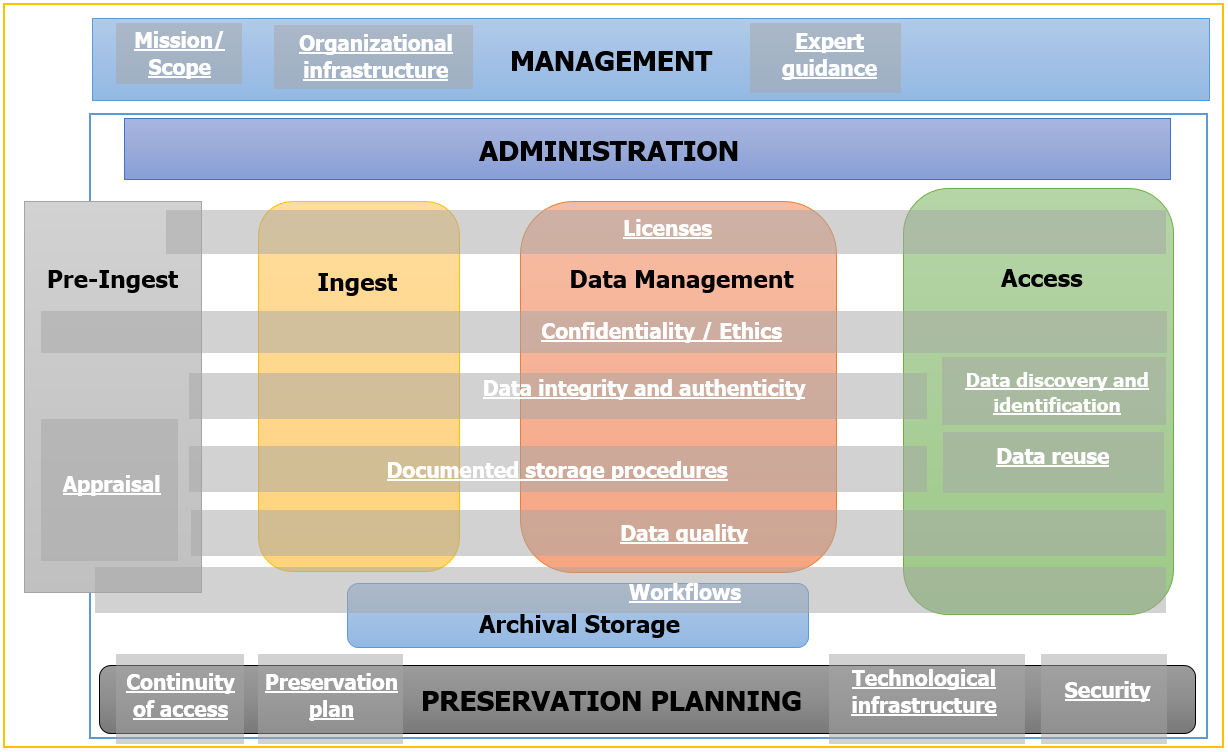Organizational Infrastructure
Datum objave: 08. 04. 2017 Datum zadnjega pregleda: 08. 04. 2017
Kako citiram to stran?
Arhiv družboslovnih podatkov. LETO. Organizational Infrastructure. Dostopano prek: http://adp.fdv.uni-lj.si/eng/spoznaj/politika/infrastruktura/ (DD. mesec leto).
Legal grounds, ethical norms, and responsibilities
The functioning of ADP in the Slovenian research environment is subject to certain rules of exchange and use of knowledge and information. The functioning must be in accordance with the relevant national legal framework defining the area of access and use of digital objects. It is essential that the ADP informs its users about the content of the relevant legal framework and monitors compliance with the existing rules. During its activities, the ADP carefully follows the relevant legislation: Personal Data Protection Act, Copyright and Related Rights Act, General Data Protection Regulation (GDPR), Law on the Protection of Documents and Archives and Archival Institutions, The Law on Access to Public Information, and the Law on National Statistics. In addition to following The Law on Personal Data Protection Act, the ADP takes into consideration relevant codes of ethics of the social sciences’ research community. Relevant (disciplinary) codes of ethics are:
- Code of Ethics of the University of Ljubljana,
- European Code of Conduct of Research Integrity,
- Code of Professional Ethics of the Slovene Sociological Society,
- Declaration of Code of Professional Ethics of the Slovene Statistical Society.
With respect to the rules of ingest and the rules of access to materials and research data, the ADP uses fixed standardized forms. Ingest of research data is accompanied by documentation of compliance with ethical standards, legal frameworks and good practices. The ingest agreement, in the form of a Deposit Agreement Deposit Agreement, signed by the data depositor and the disciplinary data provider (ADP), defines the relationship between the two parties: it gives the disciplinary data provider the right to process the study for the purpose of digital preservation and gives users the right to access the research data.
Research data and accompanying documentation are available to users under Creative Commons 4.0 licenses. The ADP uses the following Licenses: CC0 – without restrictions, CCBY – attribution alone, CCBYNC – attribution + non-commercial. Final responsibility for the use of research data that takes into consideration ethical principles of confidentiality, copyright, and academic honesty lies on the user of research data. Users need to agree with the General provisions and terms of use upon registration.
The model of digital preservation
The ADP follows the OAIS model (The Open Archival Information System; ISO 14721: 2012) and the requirements of the Core Certificate of Trustworthy Data Repositories in its processes of long-term digital preservation. Image 1 on the next page presents the compliance of ADP's operations with the OAIS model and the Core certificate.
The OAIS model is composed of three complex information objects: submission information package (SIP), archival information package (AIP) and dissemination information package (DIP). These three information objects represent the state and transformation of digital content, together with metadata from the point of ingest, through archival storage and finally to giving access to users. Due to the procedure of pre-preparation and active acquisition of materials, a phase of pre-ingest or pre-SIP is added to the model (see Producer-Archive Interface – Methodology Abstract Standard (PAIMAS) - ISO 20652: 2006), where communication with possible data providers is established, and an evaluation of the suitability of the study for the collection of ADP is made. On this basis, a decision is made, which studies to ingest.
Collection Development Policy
The ADP contains research data of interest to social science researchers dealing with problems of the Slovenian society and social sciences, regardless of geographical boundaries. Priority is given to studies that achieve theoretical, conceptual and methodological excellence, especially longitudinal and internationally comparable data that include data from Slovenia. Exceptionally, studies that do not fall into the above categories may be included, e.g. (1) studies that do not fall strictly into the social sciences but are structurally similar to data from this field and have no other curation option, (2) data from related disciplines, especially if relevant from an interdisciplinary use perspective (e.g., humanities, medicine), and (3) new types of data that are interesting for testing new approaches.
Long-term preservation of research data requires additional effort and cost to prepare it in a format that allows for continued use. This cost and effort are justified by the savings that lie in the continued reuse of the data. The ADP involves additionally the professional public in determining the goals of the archive by encouraging the ADP Council to define main problem areas and development initiatives in order to expand the collection of the ADP to new areas.
Each study that enters the ADP system is firstly assessed in terms of its formal and technical appropriateness for the inclusion into the collection. Secondly, each study is evaluated in terms of its scientific quality, relevance and reuse potential. The purpose of evaluating studies with research data is to assess the importance and justification of archiving and storing research data, consistent with the mission of ADP.
Principles and strategy of digital preservation
The basic strategy of digital preservation in the ADP is normalization at ingest. For this purpose, the ADP has set rules of appropriate formats of data files that are being accepted from data providers, as well as compatible formats for long-term digital preservation (see Recommended formats).
The ADP has a mandate to preserve its collections digitally for the long term. The primary goals of the digital archive are to preserve files and other materials for the long term, particularly in conjunction with the following principles:
- Maintaining data integrity: ensuring that archived data is protected from unauthorized modification.
- Maintaining authenticity: ensuring that digital objects come from a documented creator and that they are what they purport to be.
- Completeness: no parts of the digital object are missing.
- Preservation of readability: it is always possible to view and interpret at least the most recent version of a digital information object. In this context, it is important to know what formats occur for each version.
- Preservation of discoverability: persistent identifiers (DOI, URN) and entries in relevant directories and search engines should be used.
- Maintaining confidentiality: considering relevant legal regulations, ethical and disciplinary standards.
By fulfilling the above principles and creating transparency of its activities to the outside world, the ADP contributes significantly to the credibility of the data archive, which is one of the core objectives of this document.
Concerning the continuity of access, the ADP assures that appropriate local equipment and procedures for long-term digital storage are implemented. In addition, existing tools and services of a backup security duplication in the national environment are used. The ADP aspires to practice the policy of open access that determines that the service in the framework of open access to research data for final users is free of charge.
ZADNJE OBJAVLJENE RAZISKAVE
Družbena integracija ukrajinskih beguncev v Sloveniji, 2023
AKTIVNOSTI ADP
Spletni seminar SPOZNAJ: Podatkovne objave v odprti znanosti
Predstavitev novega učbenika: Odprta učna gradiva z uporabo odprtih raziskovalnih podatkov





